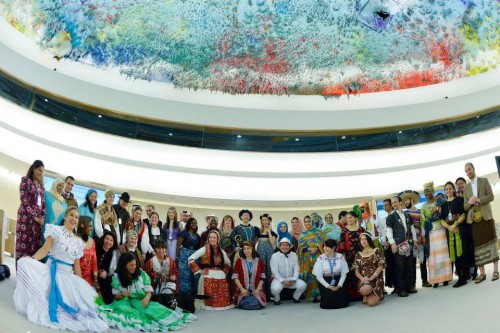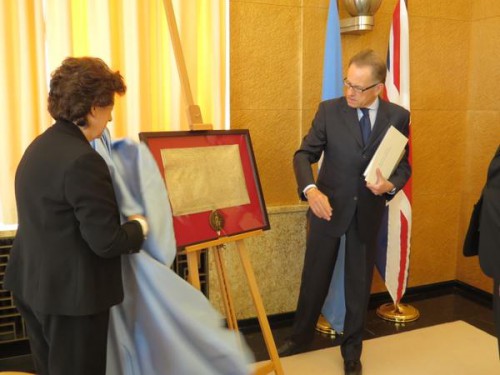9th March 2015 Geneva, Switzerland
Lessons in History
While I was never the life and soul of all night parties – prone to having a little nap while others danced round me – I did at least used to be active and go out on a regular basis. These days, instead of thinking about finding new places to ski within easy reach of a great place to party, I’m much more likely to be concerned with finding a convenient place to park within easy reach of a shopping trolley. And running out of beer at home is far less of a worry than running out of camomile tea.
So Friday’s annual national dress day at the Human Rights Council came as a nice change. To mark the 800th anniversary year of the Magna Carta, the UK delegation wore costumes from 13th century medieval England. For a day at least, it seemed everyone wanted a photo and at the evening’s celebration, Council colleagues voted the Brits as the best dressed delegation. I like to think the citizenry of England would have been proud. It was a nice way to end the week and as I haven’t managed to pick up my dry-cleaning this weekend, I may be forced to wear my costume again before the session is over. And before there’s any controversy over the colour, my outfit was blue and gold.

Although it was not originally intended to be the foundation of a code of human rights, the Magna Carta’s proclamations against arbitrary detention and that ” to no one will we deny or delay right or justice” have given it an iconic status. Such was its enduring significance that Eleanor Roosevelt said the Universal Declaration of Human Rights, might well become the international Magna Carta. During her visit for the Council’s opening High Level Segment Foreign Office Minister Baroness Anelay reminded delegates of the Magna Carta’s ongoing relevance and presented the Director General of the UN in Geneva with its first ever official copy for public display. Baroness Anelay’s previous experience as a history teacher was plain to see when she later held a lively question and answer session on the history behind the Magna Carta with diplomats and around a hundred children from local schools. I learnt a thing or two as well.

The Ministerial week drew some big names this year, and it’s a sign of the Council’s increasing importance that it can now attract such a distinguished line up. US Secretary of State John Kerry was among those who joined Baroness Anelay in raising the ongoing situation in Ukraine where violations and human rights abuses continue. He urged the Council to shine its light on Crimea and the separatist-controlled areas of Eastern Ukraine in response to killings, torture, rape, arbitrary detentions and religious persecution. So far the Council’s attention to Ukraine has been limited and will require much greater consideration if violations keep continuing.
High Commissioner Zeid’s remarks at the Council’s opening were also powerful and thought -provoking. He condemned once again the merciless conduct of violent extremists, while calling firmly on states to uphold their human rights obligations when countering terrorism. He said “if we are not completely principled and cunning in our collective attempt to defang them we will unwittingly and inexcusably be advancing their interests.” He also criticised states for their selective approach towards human rights, saying countries could not pick and choose rights enshrined by international law. He didn’t mention anyone by name but indirectly criticised both the west for trumpeting non-discrimination on the grounds of gender and sexual orientation while ignoring the plight of migrants as well as developing countries for promoting social rights while trampling on civil and political rights.
I was also particularly impressed by Botswana Foreign Minister Pelonomi Venson Moitoi’s powerful speech, which raised concern over Syria and North Korea, and set out her firm commitment to ending gender based discrimination. It was particularly heartening to hear her pay tribute to the work of members of civil society in championing the rights of the most vulnerable around the world. As space for civil society, and especially human right defenders, comes under increasing attack in many countries, the voices of countries like Botswana will become increasingly crucial within the Council.
Now that Ministers are safely out of Geneva, week 2 of the session will see most of us get on with the nitty gritty of negotiating resolutions. I look forward to seeing many of you in the UN’s underground rooms for hours on end over the coming weeks.
Finally, since I’m writing after midnight, I’d like to wish my son Ben a Happy Birthday. He’s just turned 796 years younger than the Magna Carta in case you were wondering.

You all look very dashing indeed.
congratulations
Thanks for the history lesson. I was also impressed especially by the speeches of the High Commissioner for Human Rights and the Foreign Minister of Botswana. Gave me hope.